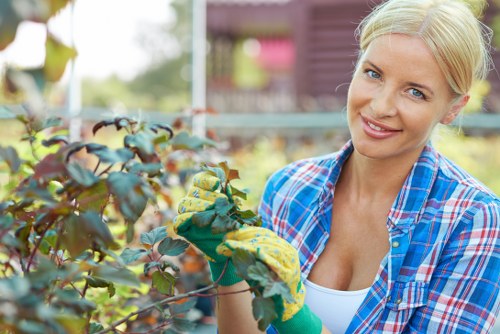Tree Lopping and Removal in Garden Fencing
Introduction to Tree Lopping and Removal

Maintaining a beautiful and functional garden often requires tree lopping and removal. Whether it's for safety, aesthetics, or practicality, understanding the process is essential for any garden enthusiast.
Tree lopping involves the selective removal of branches, while tree removal refers to completely taking down a tree. Both practices play a crucial role in safeguarding garden fencing by preventing overgrowth and potential damage.
Proper management of trees ensures that garden fences remain intact, offering both privacy and security. Neglecting tree maintenance can lead to significant issues, including structural damage to fencing and reduced property value.
The Importance of Tree Lopping and Removal

Tree lopping and removal are not just about aesthetics; they are vital for maintaining the health and safety of your garden environment. Overgrown trees can obstruct pathways, block sunlight, and create a habitat for pests.
From a safety perspective, dead or weakened branches pose a risk during storms or high winds. Regular maintenance reduces the likelihood of accidents, ensuring that both your family and pets remain safe.
Aesthetically, well-maintained trees complement garden fencing, enhancing the overall look of your outdoor space. It creates a balanced environment where the fence stands out as a prominent feature rather than being overshadowed by unruly vegetation.
Choosing the Right Time for Tree Lopping and Removal

Timing is crucial when it comes to tree lopping and removal. The best period is typically during the dormant season, usually in late winter or early spring. This timing minimizes stress on the trees and reduces the risk of disease transmission.
However, immediate action may be necessary if a tree is posing an imminent threat to your property or safety. In such cases, consult with a professional arborist to determine the best course of action.
Seasonal considerations also play a role. Avoid heavy pruning during the growing season, as it can hinder the tree's natural growth patterns and overall health.
Techniques for Effective Tree Lopping

Effective tree lopping requires precise techniques to ensure the health of the tree and the integrity of nearby structures, such as garden fencing. Proper tools and methods are essential to achieve the desired results without causing unnecessary damage.
One common technique is the crown thinning, which involves removing selected branches to allow more light and air to penetrate the canopy. This method helps reduce the risk of disease and improves the overall appearance of the tree.
Another technique is crown reduction, where the size of the tree is cut back to a more manageable level. This approach is beneficial for maintaining the proximity of trees to fences without compromising their health.
Professional vs. DIY Tree Removal

Deciding between professional tree removal and a DIY approach depends on several factors, including the size and condition of the tree, as well as your own expertise and equipment availability.
Professional arborists have the necessary skills and tools to safely and efficiently remove trees. They can assess the situation accurately, ensuring that the removal process does not damage your garden fencing or other property features.
On the other hand, DIY tree removal might be feasible for smaller trees or minor lopping tasks. However, it's important to recognize the limitations and potential risks, such as personal injury or unintended damage to your garden.
Impact on Garden Fencing
Preventing Damage
Overgrown trees can exert considerable pressure on garden fencing. Branches rubbing against the fence can cause wear and tear, leading to structural weaknesses over time.
Enhancing Aesthetics
Strategically lopped trees create a harmonious balance with garden fencing, enhancing the visual appeal of your outdoor space. Well-maintained trees can serve as a natural complement to the fence, making the entire garden more inviting.
Maintaining Security
A well-placed fence, supported by properly maintained trees, provides an added layer of security. It ensures that the fence remains effective in keeping unwanted visitors out while allowing you to enjoy your garden without concerns.
Environmental Considerations
Tree lopping and removal should always consider the environmental impact. Sustainable practices help preserve the local ecosystem and promote biodiversity within your garden.
- Recycle wood debris by using it for mulch or compost.
- Choose tree species that complement the local flora.
- Implement eco-friendly pruning techniques to minimize waste.
By adopting environmentally conscious methods, you contribute to a healthier garden and a more sustainable environment.
Legal and Safety Regulations
Before undertaking any tree lopping or removal project, it's important to be aware of local laws and safety regulations. Obtaining the necessary permits and adhering to guidelines ensures that your project complies with legal standards.
- Check local ordinances regarding tree removal.
- Obtain permits if required.
- Ensure safety measures are in place during the lopping process.
Compliance with regulations prevents potential legal issues and promotes safe gardening practices.
Hiring a Professional Service
Choosing a reputable tree lopping and removal service can make a significant difference in the outcome of your project. Look for certified arborists with positive reviews and a track record of quality work.
- Verify credentials and certifications.
- Ask for references or read customer testimonials.
- Compare quotes to ensure competitive pricing.
Investing in professional services ensures that the job is done correctly and efficiently, giving you peace of mind.
Cost Factors
The cost of tree lopping and removal can vary based on several factors. Understanding these can help you budget appropriately for your project.
- Tree size and height.
- Accessibility to the tree location.
- Health and condition of the tree.
- Proximity to structures like garden fencing.
Obtaining multiple quotes and discussing these factors with your chosen service provider ensures transparency and fairness in pricing.
Aftercare and Maintenance
Post-lopping and removal care is essential to ensure the continued health of your garden and fence. Regular inspections and maintenance can prevent future issues.
Inspecting the Fence
After tree maintenance, check your garden fence for any signs of damage. Promptly address any issues to maintain the fence's integrity and appearance.
Tree Health Monitoring
Keep an eye on the remaining trees to ensure they are healthy and not posing any new risks. Proper care, such as watering and fertilizing, supports their growth and stability.
Ongoing Maintenance
Establish a regular maintenance schedule for both trees and fencing. This proactive approach helps sustain the beauty and functionality of your garden.
Benefits of Regular Tree Maintenance
Consistent tree maintenance offers numerous benefits that extend beyond the immediate scope of garden fencing.
- Improved Safety: Reduces the risk of accidents caused by falling branches.
- Enhanced Aesthetics: Keeps the garden looking neat and well-kept.
- Increased Property Value: Well-maintained trees and fencing add to the overall appeal of your property.
- Healthier Trees: Regular care promotes the longevity and vitality of your trees.
Investing time and resources in tree maintenance pays off in the long run, ensuring a safe and beautiful garden environment.
Choosing the Right Tree Species
Selecting the appropriate tree species can significantly impact the dynamics between your trees and garden fencing. Consider factors such as growth rate, root system, and canopy spread.
Fast-Growing Trees
These trees can quickly provide shade and privacy but may require more frequent maintenance to prevent overgrowth near fencing.
Deep-Rooted Trees
They are less likely to interfere with garden fencing but may take longer to establish.
Small to Medium Canopy Trees
Ideal for gardens with limited space, these trees offer beauty without overwhelming the area.
Sustainable Practices in Tree Removal
Adopting sustainable practices during tree removal contributes to environmental conservation and responsible gardening.
- Recycling Wood: Use wood chips for garden pathways or as mulch.
- Planting Replacements: Replace removed trees with native species to maintain biodiversity.
- Minimizing Waste: Plan the removal process to reduce debris and unnecessary waste.
These practices ensure that tree removal is conducted responsibly, benefiting both your garden and the broader ecosystem.
Common Challenges and Solutions
Tree lopping and removal can present various challenges. Being prepared with solutions can make the process smoother and more efficient.
Accessibility Issues
Trees located in hard-to-reach areas may require specialized equipment or techniques. Hiring professionals ensures that these challenges are effectively managed.
Damage to Fencing
Preventing damage to garden fencing during tree maintenance involves careful planning and execution. Techniques such as using protective barriers can safeguard your fence.
Tree Health Concerns
Maintaining the health of surrounding trees during lopping requires expertise. Professional arborists can implement methods that support the overall well-being of your garden's flora.
Conclusion
Effective tree lopping and removal are integral to maintaining the harmony and functionality of your garden fencing. By understanding the importance, techniques, and best practices, you can ensure a safe, beautiful, and sustainable outdoor space.
Remember, whether you choose to undertake the maintenance yourself or hire professionals, prioritizing the health of your trees and the integrity of your garden fence is paramount.
Contact us today to learn more about our tree lopping and removal services, and take the first step towards a well-maintained and stunning garden.